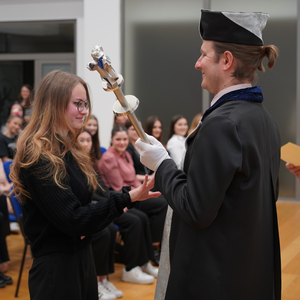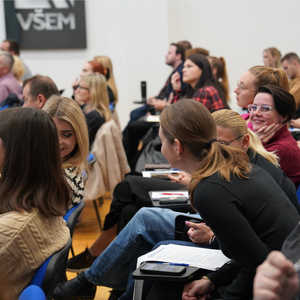Student is obliged to pass the final state examination within 4 years
The final state examinations in Communication and Human Resources include the examinations in Economics, Professional Basis, and Professional Specialization.
Student is obliged to pass the final state examinations within 4 years from the enrollment for the first trimester of studies at the College of Economics and Management. Otherwise, the student is considered as a student dropping out from studies without any compensation.
Content of the final examinations
Final examination (FE)
| Study module
|
|---|
| Economics |
Managerial Economics |
| Professional Basis |
Business Economics (I, II), Staffing and Human Resources (I, II) |
| Marketing (PS) |
Marketing, Marketing II |
| Advertisement a PR (PS) |
Marketing, Advertisement a PR |
| Law and Entrepreneurship (PS) |
Law and Entrepreneurship, Law and Entrepreneurship II |
| Quality Management (PS) |
Management, Quality Management |
| Project Management (PS) |
Management, Project Management |
| Information Strategy (PS) |
Information Systems and Technology, Information Strategy |
| Public Administration and EU (PS) |
Managerial Economics, Public Administration and EU |
| Communication and Media (PS) |
Marketing, Communication and Media |
Final Examination in Economics
The final examination in Economics has form of a written examination. The topics are based on the standard requirements for microeconomics, macroeconomics, and economic policy (length of the examination is 60 min., number of choice questions is XX, number of open questions is XX).
- CONSUMER THEORY: indifferent curves, budget constraint, consumer equilibrium, derivation of a demand curve, substitution and income effects.
- PRODUCTION THEORY: production theory, special forms of a production function, production in a short period, production in a long period, isoquants, isocosts, the lowest costs production, production costs.
- PERFECT COMPETITION: characteristic features of perfect competition, equilibrium in a short period, equilibrium in a long period, supply industry curve in a long period.
- MONOPOLY AND OTHER FORMS OF IMPERFECT COMPETITION: characteristic features of a monopoly, equilibrium in a short period, equilibrium in a long period, price discrimination, natural monopoly, monopolistic competition, oligopoly, trusts.
- PRODUCTION FACTORS MARKETS: variable production factor demand in a short period, offer of jobs, equilibrium wages/salaries and employment, annuity, interest rate, profit, present value.
- MACROECONOMIC STATISTICS: gross national income, other ways of income measurement, nominal and real quantities, employment and unemployment, inflation measurement, types and problems of price indexes.
- MACROECONOMIC ANALYSIS: income and expenditure model, function of economies and investments, multiplier, analysis of aggregate offer and aggregate demand.
- MACROECONOMIC ECONOMIC POLICY: macroeconomic policy oriented to supplies and demands, fiscal and monetary policy (principles, tools, and alternative attitudes).
- MICROECONOMIC ECONOMIC POLICY: market failure, structural policy, policy of protection of economic competition, redistributing policy, regional policy, ecologic policy.
- INTERNATIONAL ECONOMICS: comparative advantage, utility of trade, restraints of trade, exchange rates, purchasing power parity, balance of payments, business policy, exchange rate policy.
Final Examination in Professional Basis
The final examination in Professional Basis has form of a written examination. The topics are based on the standard requirements for Business Economics, Staffing and Human Resources and Staffing and Human Resources II (length of the examination is 60 min., number of choice questions is XX, number of open questions is XX).
- PURCHASE AND PRODUCTION: organisation and purchasing activities management, resources management, production principles, subject, way, and purpose of production, production planning, production capacity.
- PROPERTY AND CAPITAL STRUCTURE OF A COMPANY: structure of company assets, capital structure of a company, balance, evaluation of company property, company restructuralisation.
- ECONOMIC RESULT AND PROFIT: relationship between revenues, costs, and economic results, sales, costs, relationships between a profit, production volume, price and costs, selection of an optimal variation, optimal profit point, operation lever.
- INVESTMENT ACTIVITIES: investment conception, investment planning, investment projects classification, company investment classification, financial investment resources, investment effectiveness.
- PERSONNEL WORK: conception and importance, personnel strategy and personnel policy, staff department and staff manager profile.
- HUMAN RESOURCES MANAGEMENT: staff planning, staff acquirement, staff selection, staff engaging, staff placing, signing off.
- PERSONNEL MANAGEMENT: working hours, working behaviours, working environment, occupational safety, job evaluation and premium, wages forms, employee relations, collective bargaining.
- HUMAN RESOURCES DEVELOPMENT: duties development management, manager´s development, employees´ development system, educational system, forms and methods of education, social policy, social programmes.
- MANAGERIAL SKILLS: strong and weak points of potential skills, skills in management, leading and managing, managerial techniques in company strategies, crisis management.
- COMPANY CULTURE: conception, company conception, problems of company culture, classification of organizations, patterns and values, strong and weak points of company culture, ethical standards and codes, importance of company culture.
Final Examination in Professional Specialization
The final examination in Professional Specialization has form of a written examination (length of the examination is 60 min., number of choice questions is XX, number of open questions is XX). The content is specified within the topics involved in
annotation of corresponding professional specialization.








